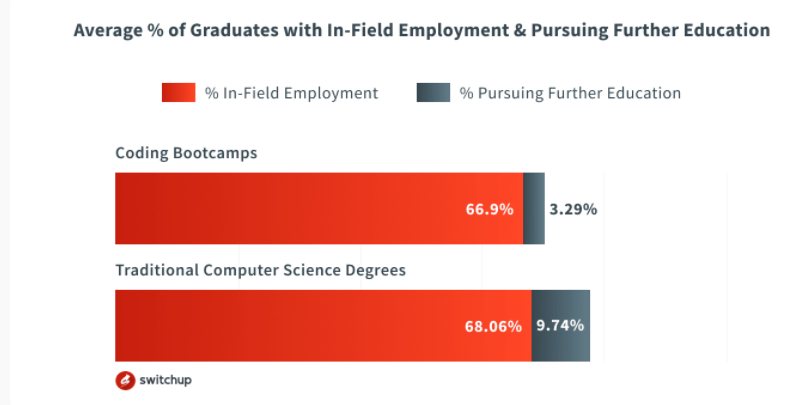You don’t need a college degree to find work as a software engineer, even if it helps in the case of more specialized roles. Thanks to the rise of coding bootcamps and easily accessible online learning tools, developing the skills to prepare you for a tech role looks much different in 2021 than a decade ago. According to a new study, bootcamps can even be better in getting students to tech jobs than colleges or universities.
But it depends on the bootcamp.
Research related to workforce trends from analytics company Burning Glass Technologies and analyzed by SwitchUp, a site for finding bootcamps, indicates that some bootcamps have higher employment rates in tech than computer science programs from prominent universities. At the same time, bootcamp alumni are less likely to pursue further education after completing their bootcamps than college alumni.
Burning Glass assessed bootcamp and college alumni in-field employment rates in the year following their graduation, as well as the percentage of people pursuing further education. The top 21 bootcamps with an in-field employment greater than 50% were compared against employment data of 35 top-ranked computer science programs. Here’s more on SwitchUp’s methodology.

The org found that bootcamps offer similar, and in some cases, higher in-field employment rates compared to computer science degrees from well-known and respected universities — around 67 and 68%, respectively. While those bootcamp graduates tend to not pursue more education after graduating, many bootcamp graduates already have college degrees before entering bootcamps, the report notes.
Four bootcamps saw at least 80% of their graduates land tech jobs after completing their programs, while only two universities — University of Pennsylvania and Baltimore’s Johns Hopkins University — had the same rates. One of those bootcamps is Tech Elevator, which has five physical campuses including in Philly, Pittsburgh and one coming soon to Wilmington.
Tech Elevator had 85% of its graduates land tech jobs compared to Penn’s 84%. Of Penn’s tech graduates, 43% work in information technology, including a sizable chunk hired by Big Five tech companies. Other ranked bootcamps include Flatiron School, with a 67% in-field employment rate; General Assembly, with a 64% rate and Philly-focused online “community”; and Coding Dojo, with a 56% rate. (Flatiron, for its part, claims an 86% global job placement rate, specifically for job-seeking grads from calendar year 2019 who are now in full-time salaried roles, full-time contract, internship, apprenticeship and freelance roles, and part-time roles, all related to their field of study.)
While bootcamps can cost attendees thousands of dollars to attend, on average they are still a fraction of the cost and time of a typical college education. Bootcamps are not without their flaws, but the report is further evidence that they should be considered as a serious option for anyone focused on landing their first tech job.
See full results






